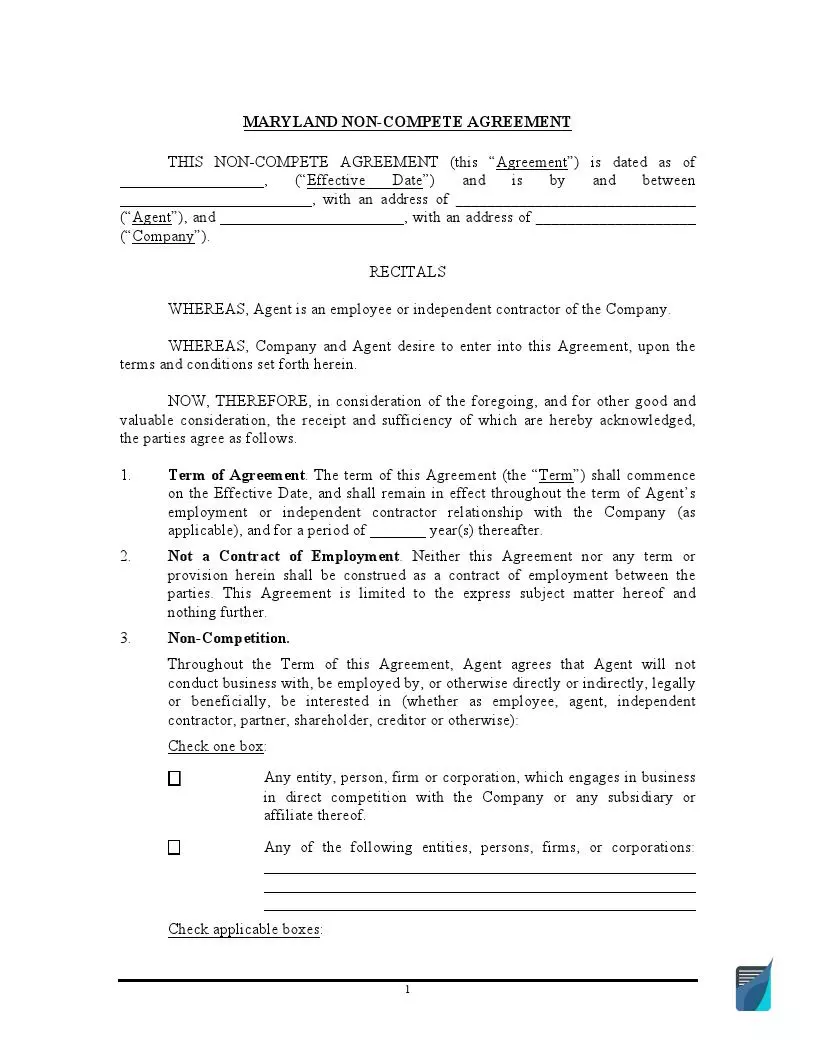Maryland Non-compete Agreement Template
A Non-Compete Agreement in Maryland represents a company’s intention to protect its confidential data by restricting the employee’s labor mobility. It is no wonder that all businesses have potentially confidential data and intellectual property they do not want to share with third parties (for competition reasons). Therefore, they try to protect it from leaking by all appropriate legal means. The non-compete agreement is one of them.

Build Your Document
Answer a few simple questions to make your document in minutes
Save and Print
Save progress and finish on any device, download and print anytime
Sign and Use
Your valid, lawyer-approved document is ready
Under a non-compete agreement, the employee (also known as the recipient) should not disclose any company’s proprietary information or commercial materials for a period predetermined in the non-compete agreement template. The disclosure liability is only valid if the employer can prove the subject employee has promised to adhere to the prescribed conditions and restrictions.
As companies struggle to protect their data, they refer to all available lawful ways to do it. An NCA is binding for both parties. On the one hand, the employer gets the right to hold the recipient accountable for disclosing any information obtaining commercial value by limiting their freedom of movement and professional growth to a certain extent. And on the other hand, the employee is protected by the NCA from any false or unfair accusations within their professional duties. A non-compete agreement is an excellent legal tool for both parties to defend their rights in court if needed.
It is worth mentioning that once you fill out and sign the Maryland Non-Compete Agreement form, you will not be able to make any amends to it until the agreement effectively terminates or expires. Please take that into account before signing an NCA.
Hereunder, you will find some more information on the state legislation, local procedures, and restriction regarding non-compete agreements.
Popular Local NCA Forms
Non-compete agreements are acknowledged and enforced to a varying degree by the majority of US states, which makes them quite widespread among a lot of organizations. Discover more about the most popular states requested by our website users when it comes to non-compete agreements.
Maryland NCA Laws and Restrictions
There is no general Maryland statute governing non-compete relations in the state. This type of agreement is only enforceable if it is ancillary to the employment contract and provided all its respective terms and conditions are adequate. With an NCA, the employer may limit the employee’s career movement in geographic and industry scope. However, such limitations’ lifespan should not be too long (usually, it does not exceed two years).
Despite the absence of a general Maryland statute, there are particular restrictions concerning non-compete agreements in the state. Maryland legislation has enacted a Non-Compete and Conflict of Interest Clause Act (of October 1, 2019). Under this Act, the state courts are entitled to review conflict of interest or non-compete cases of the employees who make not less than 31,200 U.S. dollars annually or 15.00 U.S. dollars per hour. The new law prohibits forcing non-compete agreements on employees whose income rate is lower than stated above. Besides, broadcasters, physicians, psychologists, nurses, and social workers are exempt from signing an NCA.
If you ever decide to file for a non-compete violations lawsuit, the state court would have to examine many factors to determine the conflict of interest outcome, including:
- If the subject non-compete conflict contradicts public interest
- The skills’ uniqueness of the subject employee limited by an NCA
- The actual necessity of the NCA limitations to protect the company’s confidential data, trade secrets, intellectual property, reputation, and place in the market
- Fairness of the implied restriction and career limitations. If the subject work is the only means for the worker to earn a living and support their family, the restraints are recognized as unfair and unjustified.
- The nature of the employee’s alleged agreement breaches (related or not to the conflict clause)
Nonetheless, the new law has some serious disadvantages. Neither does it contain any information on the penalties for NCA violation, nor does it create a legal framework for employees to object to non-compete prohibitions. In other words, it does not create a precedent to enforce the state law. Thus, the local authorities assume that any non-compete clause is initially void on its grounds.
Suppose an employer accuses an employee of violating the NCA. But the employee’s total gross income is below the designated maximum compensation (as stated in the Non-Compete and Conflict of Interest Clause Act) paid for breaching the non-compete clause. In this case, the worker can file a counter allegation. Technically, all the accused employee has to do is prove that they earn less than the estimated amount.

Here are other Maryland forms downloaded by FormsPal visitors. Check out our step-by-step tool to customize any of these documents to your needs.
